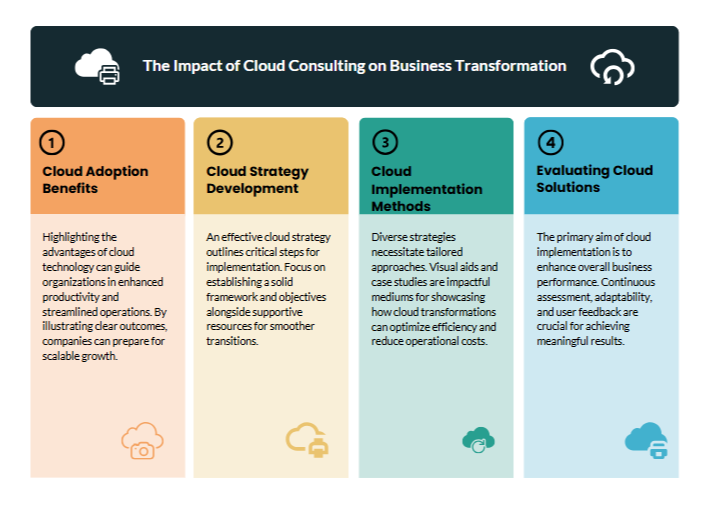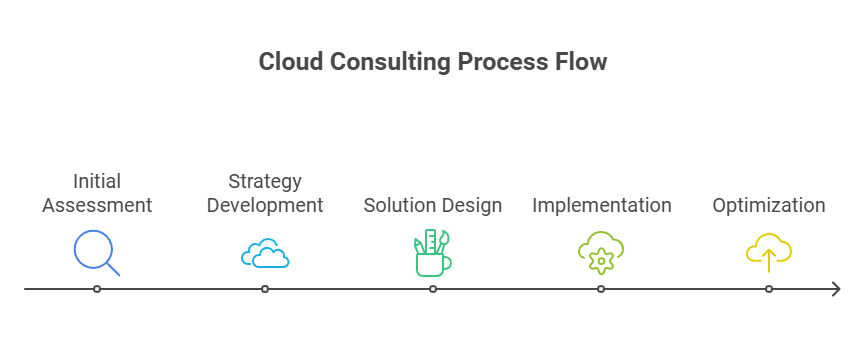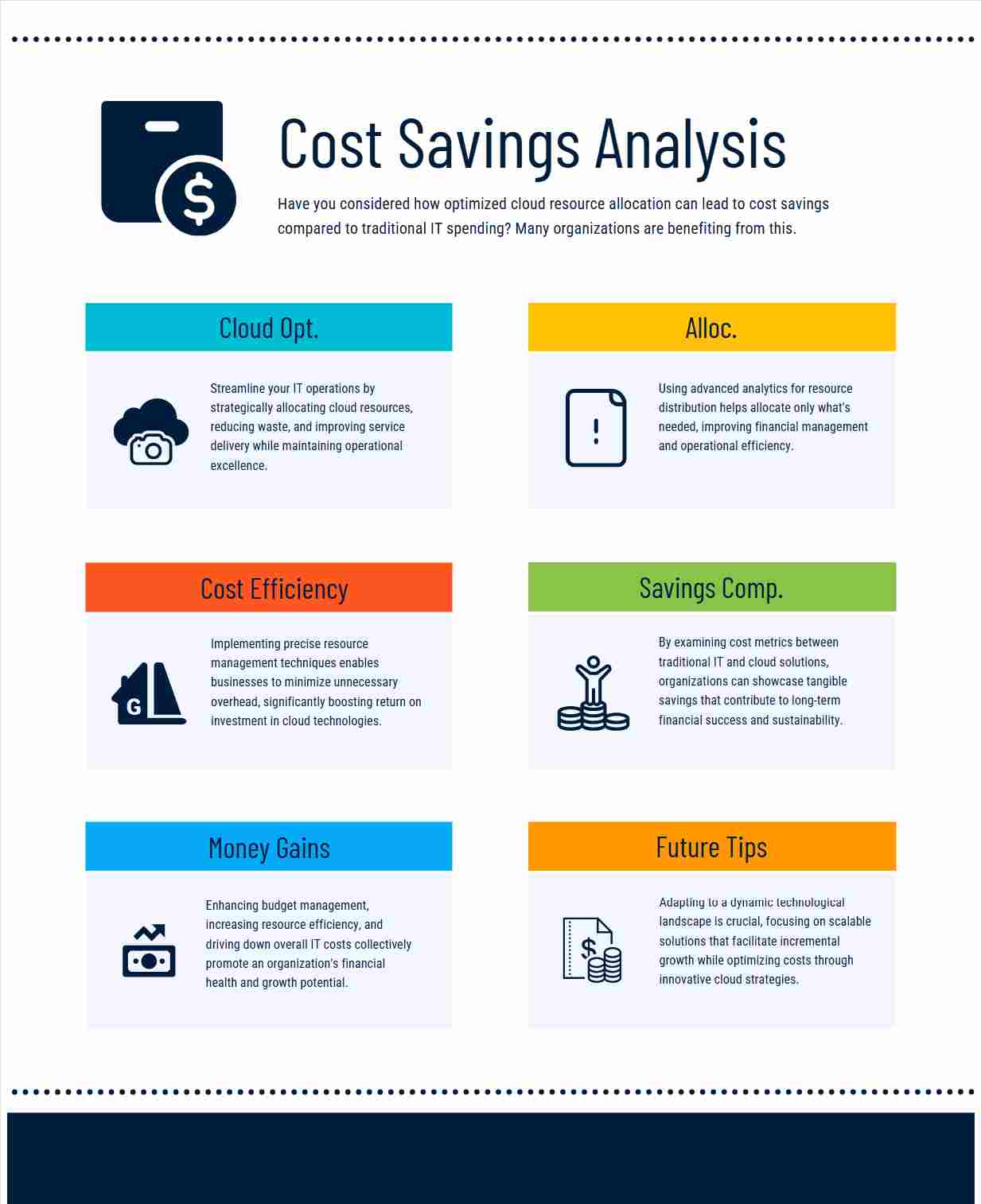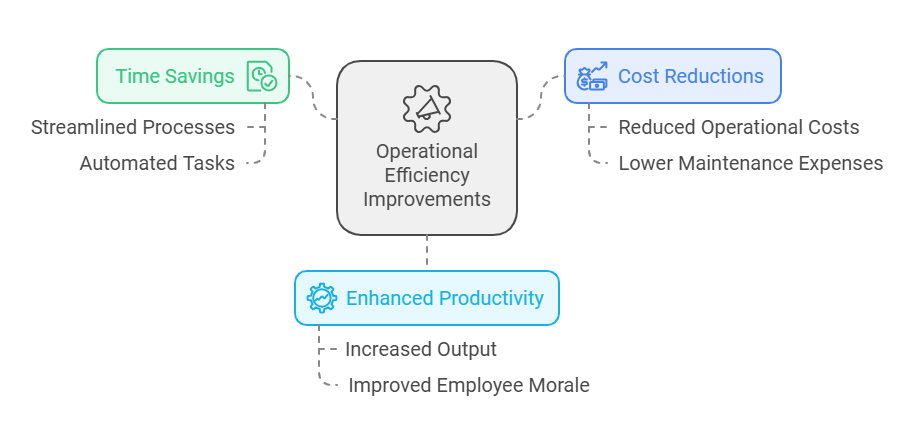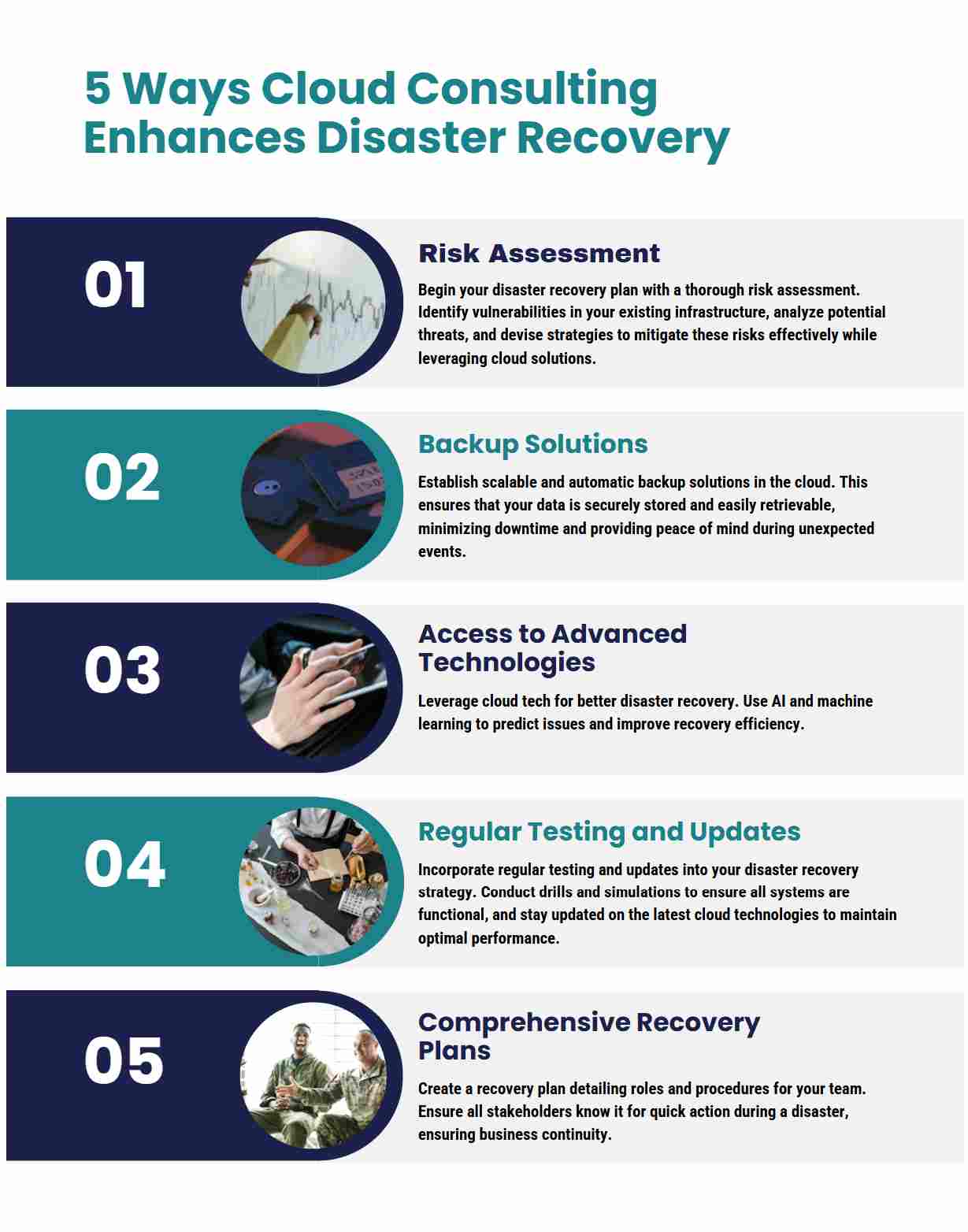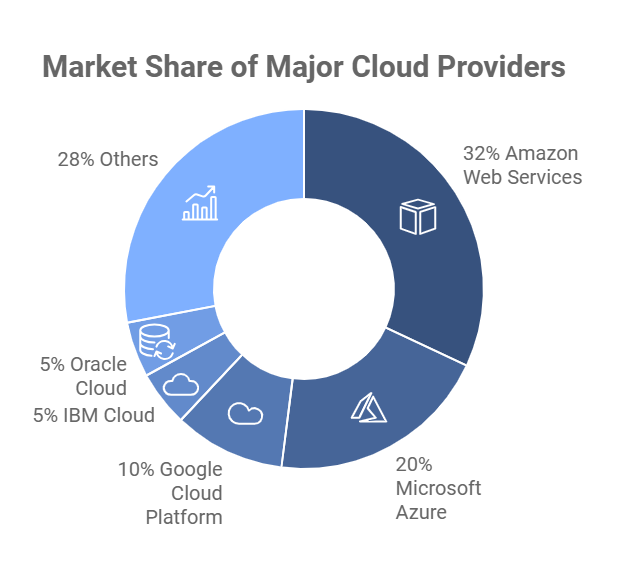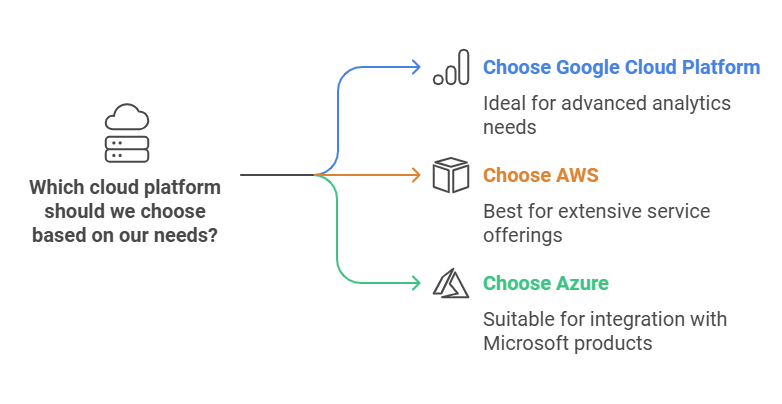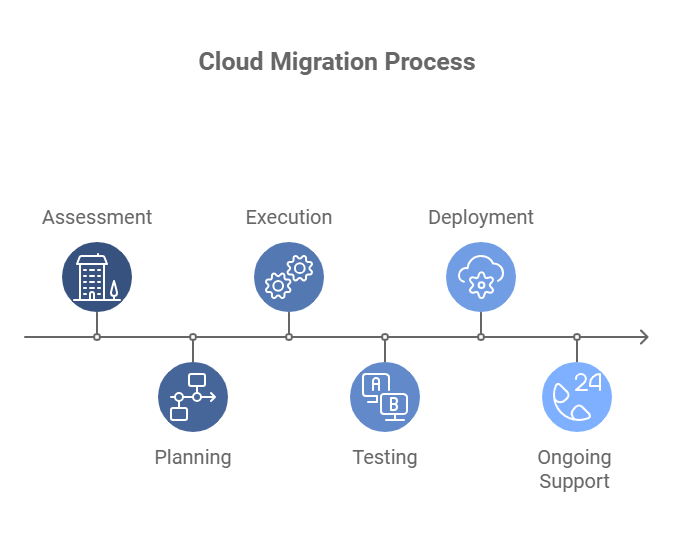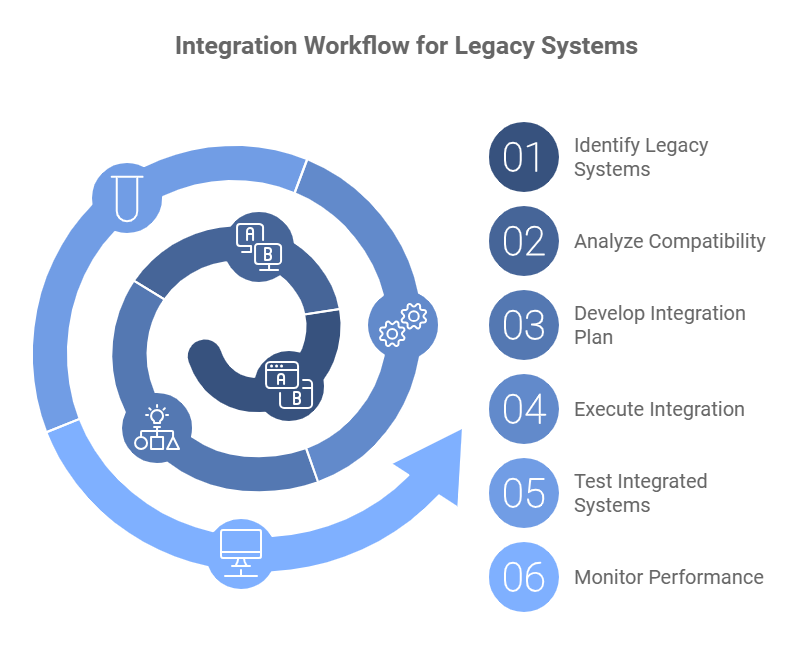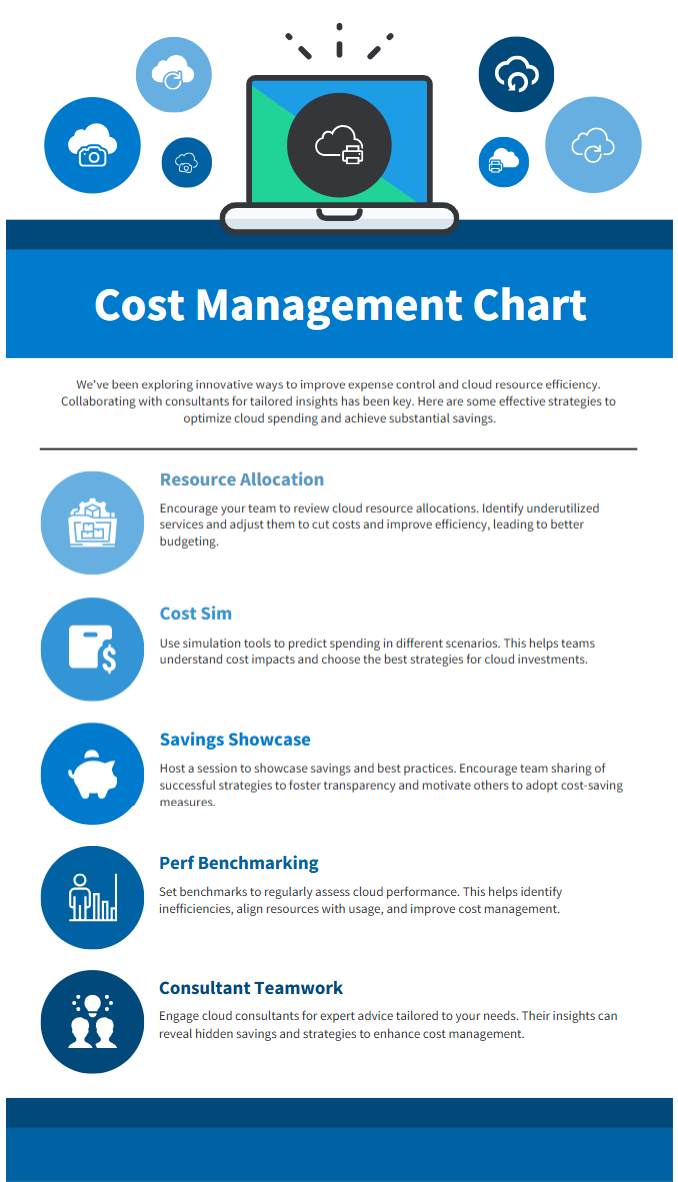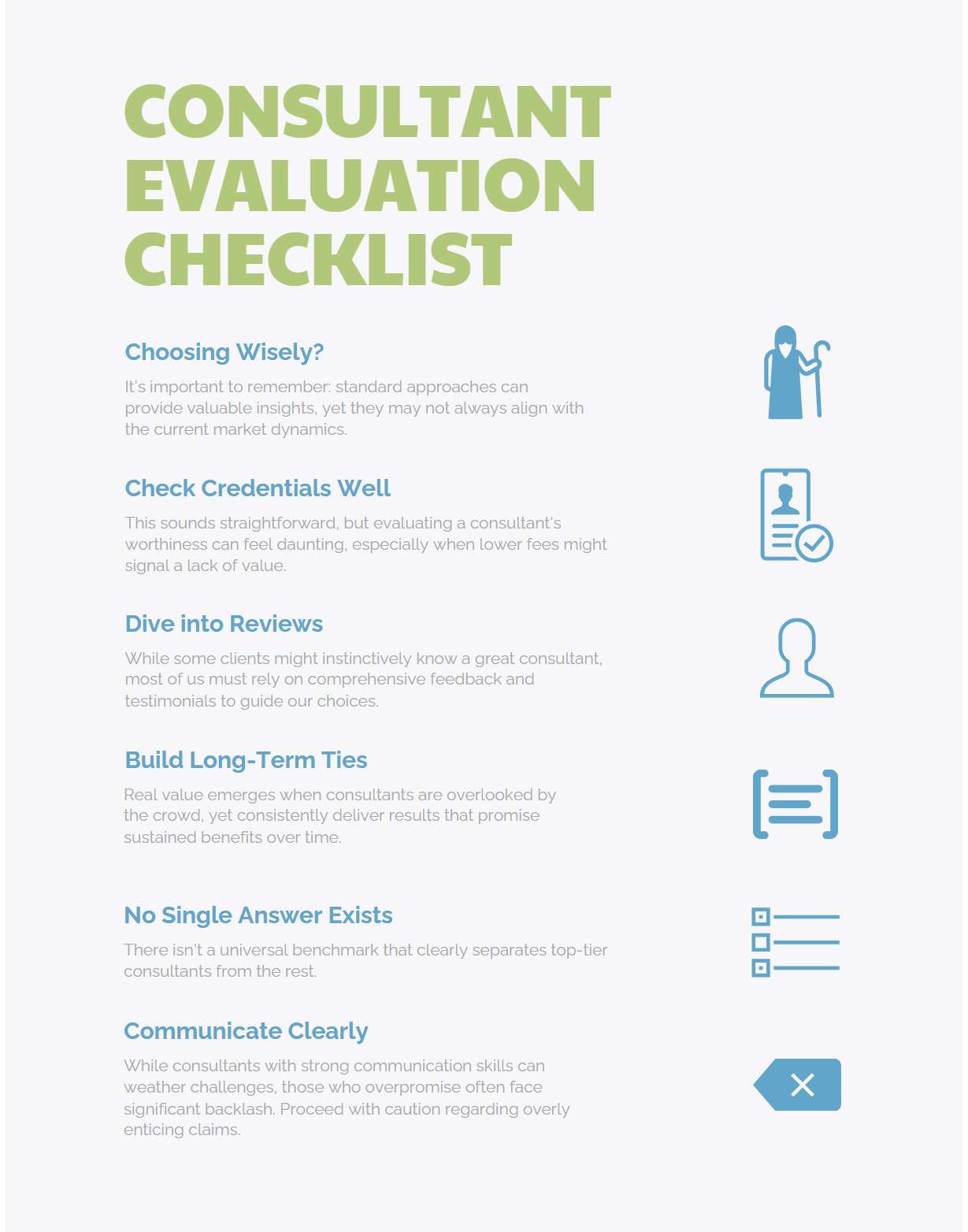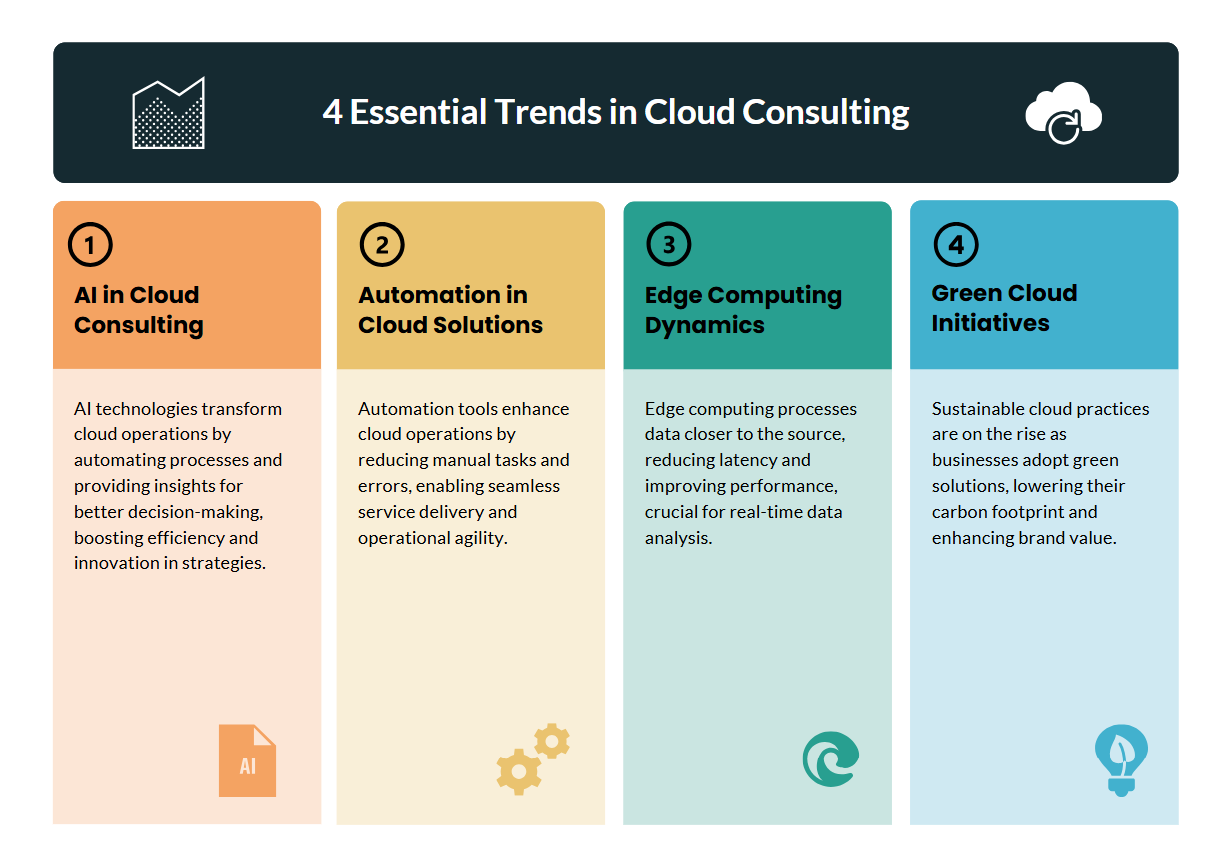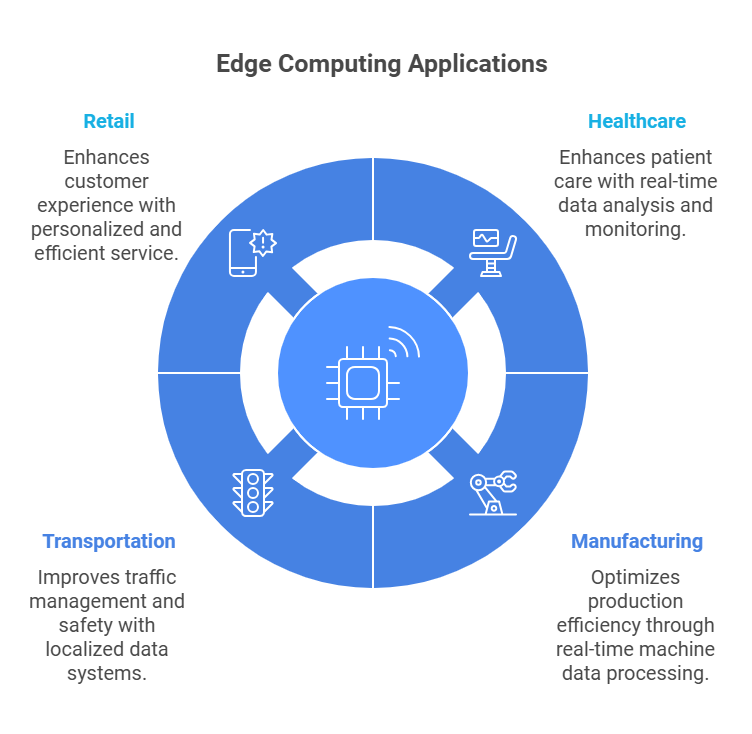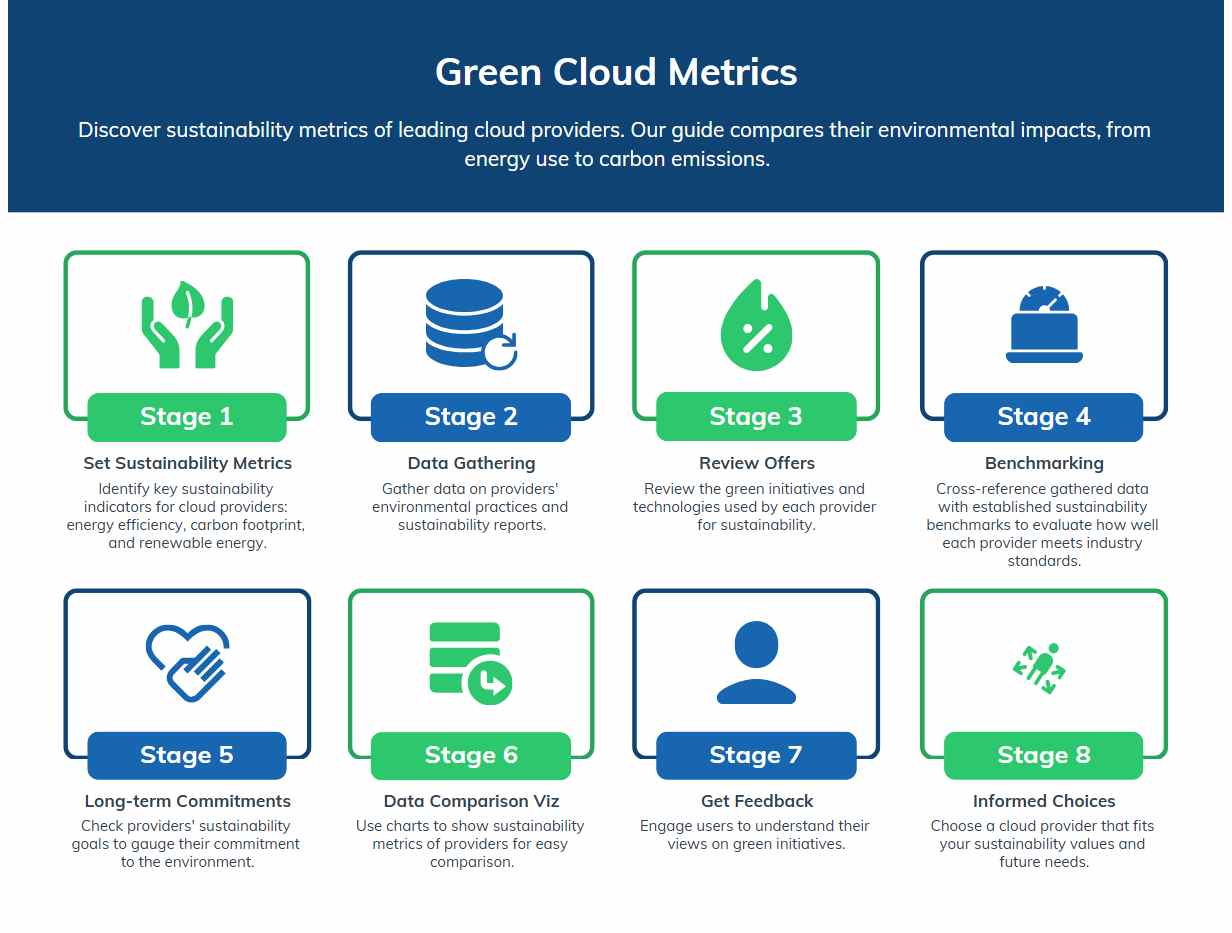Introduction: The Power of Cloud Consulting for Businesses
As we move more deeply into the digital-first world, businesses must race to use technology to get ahead of their competitors. Cloud computing is one of the most transformative innovations in this landscape. It allows companies to scale operations and cut costs, making things more efficient. The catch here is that adopting cloud technology in itself is not going to be good enough. Welcome to cloud consulting, the game changer for businesses wanting to tap into the cloud fully.
Defining Cloud Consulting
A cloud consulting company partners with seasoned experts to help the business identify what cloud provides the best, plans for the same, and implements it on the cloud platform. From crafting a seamless cloud adoption strategy to optimizing existing systems, cloud consultants ensure companies not only embrace the cloud but use it strategically to maximize ROI.
Why Cloud Strategy Consulting Matters for Startups
Cloud consulting is crucial for startups for several reasons:
- Cost Efficiency: Many startups have financial limitations. In cloud business strategy consulting, customers don’t have to make large upfront investments in their IT infrastructure, as they get to pay as they go. For example, startups make sure that they use the resources appropriately and are not worried about physical servers and software license management.
- Scalability and Flexibility: Startups grow fast, and demands change quickly. Businesses can scale their IT resources fast and easily with cloud consultants taking and adapting to changing needs without the limitations of traditional systems. Such flexibility makes sure that startups can cope with a growth spurt or a seasonal change.
- Access to Advanced Technologies: For startups, cloud computing makes the best use of the latest technologies offering artificial intelligence, and machine learning at comparatively lower costs. This enables an environment for innovation and allows startups to create solutions that go a notch above competitors in the marketplace.
- Enhanced Collaboration: Cloud computing tools enable teams to work together from anywhere and create better communication and productivity. This specifically helps geographically distributed teams work and collaborate in an effective manner.
- Improved Security: Having little resources to spend implementing robust security measures for a startup is very common. Cloud consultants also create strong security protocols including encryption and multi-factor authentication to protect sensitive data and maintain compliance with such industry regulations.
- Business Continuity: Built-in disaster recovery systems exist in business cloud solutions and help startups to maintain their operation in case of unforeseen dislocation. The disaster and recovery plans are designed with the help of consultants, to help the enterprises continue with their business operations in case of the devastation of their data centers.
Cloud strategy consulting gives startups the tools and the strategies they need to optimize operations, reduce costs, tighten up security, and foster innovation, increasing their chances of success in a cutthroat competition.
Why This Guide is Essential
In this comprehensive guide, we’ll explore:
- Why cloud consulting services in USA and globally are vital for businesses of all sizes.
- The unparalleled benefits of leveraging a cloud consulting company.
- How to choose the best cloud consulting partner to align with your goals.
Whether you’re a small business or an enterprise, this guide offers actionable insights to navigate the cloud consulting journey with confidence.
What Is Cloud Consulting?
Cloud Consulting Explained
Cloud consulting services for businesses involve guiding them in planning, adapting, and optimizing cloud technology solutions tailored to their specific needs. Cloud consultants exist, whether it’s small startups or large enterprises, to help businesses fully leverage the cloud without clutter, umbrage, and cost.
Cloud consultants provide expertise in:
- One assessment per unique business requirements.
- Recommending appropriate cloud-based solutions such as public, private, hybrid, or multi-cloud environments.
- Making sure the journeys from traditional IT systems to the new cloud environment are as smooth as possible.
By taking a strategic, tailored approach, cloud infrastructure consulting helps businesses focus on growth while leaving the technicalities to the experts.
Comparing Cloud Solutions
Cloud consultants help businesses choose the right cloud model by evaluating various factors like cost, scalability, security, and specific use cases. Below is a quick comparison of the four common cloud types that consultants may recommend based on your business needs:
| Cloud Type | Cost | Scalability | Security | Use Cases |
|---|---|---|---|---|
| Public | Low, pay-as-you-go | High, on-demand | Provider-managed | Web apps, SaaS, storage |
| Private | High, dedicated | Limited, custom | High, full control | Sensitive data, enterprises |
| Hybrid | Mixed, optimized | Flexible | Customizable | Mixed workloads, DR |
| Multi-Cloud | Variable, competitive | Very high | Provider-dependent | Redundancy, vendor flexibility |
The Role of Cloud Consultants
Cloud consultants play a crucial role in helping businesses transition to cloud-based solutions. After evaluating the current IT infrastructure, they align their strategies with business objectives and justify which cloud option is suitable for deploying – public, private, hybrid, or multi-cloud. Here’s how they assist organizations:
- Assess IT Infrastructure: Find the current capabilities and gaps in the existing systems.
- Choose Cloud Solutions: Based on the company’s needs, recommend what cloud services would be appropriate AWS, Google Cloud, or Microsoft Azure.
- Optimize Cloud Resources: Make sure to optimize cloud resources efficiently so that the utilization is maximized for cost-effectiveness and free scale.
- Ensure Data Security: To safeguard sensitive data, you can set up encryption and multi-factor authentication.
They also optimize processes running in a cloud environment, thus helping businesses take maximum advantage of cloud technology.
That’s not all, however. From cloud migration services to ongoing optimization, cloud consultants manage the entire lifecycle of cloud adoption. In addition, they protect data, adhere to compliance, and tweak the operation of businesses that handle money or health.
Improving Business Performance and Security
Cloud consulting enhances business performance and security through several key strategies:
- Streamlining Operations: Things such as automating tasks and streamlining operations make the business more productive, get more details done in less time, and enable them to make quicker decisions. With the help ofreal-timee data, employees can work more efficiently.
- Optimizing Resource Allocation: Existing IT infrastructure is assessed and the cloud solutions of public, private, or even hybrid models are suggested by consultants. This way businesses get to optimize their use of their cloud resources, paying less and providing good services.
- Implementing Robust Security Measures: Security protocols such as encryption andmulti-factorr authentication are included in cloud consulting. Industry regulations dictate that sensitive data is protected, and all these data breaches will be prevented by these measures, reducing data breaches to a reasonable level.
- Disaster Recovery Planning: In developing disaster recovery strategies they help ensure business continuity during unexpected events. It’s proactive, and thus protects data, without risking downtime.
- Continuous Monitoring and Optimization: Businesses can line up ongoing performance assessments of the cloud to find inefficiencies and readjust cloud resources. Secondly, it has a continuous optimization to promote operational efficiency and scalability.
Organizations can achieve long-term success by adopting a comprehensive cloud consulting strategy, and improved operational efficiency with security improvements with data.
Choosing the Best Cloud Consulting Services
To choose the best cloud consulting services for your business, consider the following steps:
- Assess Your Needs: Detail the project requirements specifically looking at requirements like scalability, budget, and security. It’s important to know your goals so you can find a consultant that fits within your business mission.
- Evaluate Experience: Choose a consulting firm with some track record in your industry and some experience with the cloud platforms you’re considering (e.g. AWS, Azure, Google Cloud.) This helps them know what the challenges are in that industry.
- Comprehensive Services: Make sure the firm can cover-to-end, starting with planning the strategy till after migration support. This defines a comprehensive approach and makes them a provider that will help you through the entire cloud journey.
- Check Reviews and Case Studies: Reach out to your clients and have them tell you about their successes or show you the case studies they have with businesses similar to yours. It can give us some insight into whether or not they’re effective and reliable.
- Communication and Transparency: Pick the companies that spell out communication and transparency on costs and timelines. A successful partnership requires a great working collaboration.
Using these guidelines you will be able to choose a cloud consulting service that will increase your business performance while having very strong security measures in place.
Why Cloud Consulting Is Crucial for Businesses Today
Digital Transformation, Cloud adoption
In today’s fast-evolving business landscape, Digital transformation consulting has become a necessity. The truth is: that companies are adopting cloud technologies as a way of staying competitive, agile, and scalable. But successfully navigating this transition requires expertise—this is where cloud consulting services for digital transformation come in.
Businesses can adapt quickly with the help of cloud solutions and get away with it with cost savings. For example, a retail business can use the cloud to scale up its resources for peak shopping times and shrink back down afterward. Without cloud consulting services, businesses often struggle to align their cloud adoption with their operational goals, leading to inefficiencies. Consultants guide businesses to capitalize on all the power of the cloud.
Cost Efficiency
One of the most significant advantages of cloud service consulting firms is the boost they provide to operational efficiency. With the pay as you go model, businesses only pay for the resources they use, but managing these resources is not so easy.
Cloud adoption best practices ensure consultants specialize in optimizing resource allocation to prevent overspending. They analyze usage patterns, recommend cost-saving measures, and suggest cost-effective cloud-based solutions. For example, a salesforce cloud consultant might recommend scalable cloud storage plans for a growing CRM database, saving the business thousands annually.
Scalability and Flexibility
Scaleability (the cloud’s ability to scale resources in real time) is exactly what makes it a great fit for fluctuating demands. For instance:
- Reaching an e-commerce platform during sales events allows it to scale up its resources.
- It allows a startup to grow its cloud infrastructure without upfront investment.
Cloud consultants are an important step in the recommendations process for scalability and flexibility. They help businesses evaluate their current and future needs, ensuring the chosen cloud technology for businesses supports growth without compromising performance or budget.
Security and Compliance
Cloud computing has built in advanced security features such as encryption, firewalls and authentication by NIST, but compliance to regulations can be a nightmare. HIPAA is for healthcare, and so on, different industries have different requirements – SQL might not be the best option to store the patient data to meet these requirements – require HIPAA or, global data privacy – require GDPR.
Cloud security consulting services help businesses:
- Select providers with robust security measures like AWS Cloud consulting service or Google Cloud Professional Services.
- Provide tailored security protocols to secure sensitive data.
- Manage compliance challenges: All operations are in full compliance with the industry standards.
Here’s a quick comparison of the key features of AWS, Google Cloud and Azure to help you choose the right cloud provider for your needs.
| Feature | AWS | Google Cloud | Azure |
|---|---|---|---|
| Scalability | Highly scalable, global reach | Strong with AI & data tools | Strong, hybrid options |
| Security | Advanced encryption & IAM | Robust security features | Extensive, enterprise-focused |
| Compliance | Broad global compliance | GDPR, HIPAA, ISO | Extensive, regulatory support |
| Pricing | Pay-as-you-go, Reserved | Pay-as-you-go, discounts | Pay-as-you-go, Reserved |
If companies want to uphold trust of customers, while avoiding costs associated with breach and regulatory fines then they can partner with a cloud security consulting services company in USA.
Key Benefits of Cloud Consulting for Your Business
Operational Efficiency
Cloud consulting is among the greatest advantages in boosting operational efficiency. Cloud computing consulting allows businesses to streamline workflows, automate routine tasks, and provide real time access to critical data.
For example, a manufacturing firm using Oracle cloud consulting services automated its supply chain tracking, reducing delays and errors. Like this, consultants also remove operational bottlenecks, enabling teams to focus on high-value activities. The result? More agile business environment and improved productivity.
Enhanced Collaboration
Today, more than ever, seamless team collaboration is critical in today’s hybrid work era. Cloud-based solutions enable remote access to applications and data, making it easy for employees to work together, regardless of their location.
Tools like Google Workspace or Microsoft 365 gain importance thanks to these consultants, who determine these tools together with an organization to meet their particular needs. For instance, a financial services cloud consultant might recommend secure document-sharing tools for compliance-focused industries. Businesses are doing this to improve collaboration without compromising on security.
Business Continuity and Disaster Recovery
Cyberattacks and natural disasters can disrupt business operations in very significant ways. Cloud migration consulting services for enterprises focus on setting up robust disaster recovery (DR) strategies. Automatic backups, redundancy, and fast recovery options if there is downtime are among the many things that cloud platforms offer.
For instance, a retail chain, working with a USA based cloud security consulting services company, seamlessly migrated to a multi cloud Disaster Recovery (DR) strategy, enabling the entire operation to start in a matter of minutes, after a server is down. Cloud consultants make sure businesses are equipped to withstand the unexpected — protecting data and reputation.
Access to the Cutting edge technologies
Storage and scaling in the cloud isn’t just about the cloud; the cloud is really a bridge to innovations that can come from Artificial Intelligence (AI), Machine Learning (ML), and Big Data analytics. Businesses can uncover insights, optimize processes and personalize customer experiences with these technologies.
Businesses are guided by cloud consultants in the way this technology fits together. For instance:
- A salesforce cloud consultant can help set up AI-driven CRM systems for better customer engagement.
- Google Cloud consulting services assist businesses in adopting data analytics tools to predict market trends.
It is this access to advanced tools that even small businesses can afford to use, and this allows them to beat industry giants in the game.
Top Benefits of Cloud Consulting for Small Businesses
Small businesses, in particular, gain immense value from cloud consulting services. These include:
- Solutions that are affordable and scalable on your limited budgets.
- No upfront costs in order to access enterprise-grade technologies.
- Ability to improvise and adapt to market changes.
With small business cloud consulting services, startups and SMEs can achieve digital transformation at a fraction of traditional costs.
Top Cloud Platforms
There are many cloud platforms in today’s modern business, each designed for specific purposes. In this post I will go deep into the most popular cloud platforms and what they provide.
Amazon Web Services (AWS)
Overview:
Top cloud consulting companies like AWS stand as the pioneer and leader in the cloud computing space. And with an unmatched global presence and broad suite of services, it is often the go to platform with many organizations.
Key Features:
- EC2 (Elastic Compute Cloud): Scalable virtual servers.
- S3 (Simple Storage Service): Secure and reliable object storage.
- Lambda: An agile application development using Serverless computing.
Benefits for Businesses:
They have unmatched scalability, top-tier security, and a huge library of tools for developers and enterprises alike. Deployed and performing seamlessly throughout the world, it has its global infrastructure.
Best Suited For:
Rapid scaling startups, enterprises with global presence, and tech businesses requiring a strong base.
Microsoft Azure
Overview:
Being an Azure user, I can attest they are a cloud platform that offers a great hybrid cloud and seamlessly integrated with all Microsoft products.
Key Features:
- Azure Virtual Machines: Scalable compute resources.
- Azure Blob Storage: Cost-effective, secure storage solutions.
- Azure Kubernetes Service: Application management with the container.
Benefits for Businesses:
The best reason to use Azure is for enterprises in the Microsoft ecosystem who are already using Office 365 and Dynamics 365. It also boasts enterprise-grade security, and hybrid cloud deployment.
Best Suited For:
With Microsoft services tapping into businesses, organizations’ need for a hybrid cloud model, and enterprise emphasis on security.
Google Cloud Platform (GCP)
Overview:
Big data, machine learning and analytics, driven by GCP’s powers, are great on Google, backed by Google’s strength in high performance computing.
Key Features:
- Google Compute Engine: Virtual machine infrastructure.
- BigQuery: Lightning Fast Advanced Analytics.
- Google Kubernetes Engine: A simplified management of containerized workloads.
Benefits for Businesses:
GCP is known for its data analytics and machine learning tools that offer businesses up to the minute insights and computational power.
Best Suited For:
Innovation-based startups are businesses that require advanced analytics and are AI/ML-driven.
IBM Cloud
Overview:
IBM Cloud specialises in hybrid cloud solutions and cutting edge technologies including AI and blockchain which makes it a very serious candidature in the enterprise space.
Key Features:
- IBM Watson AI: Advanced AI-driven solutions.
- Kubernetes: Container orchestration with a smaller surface area.
- Blockchain: Enterprise-ready, fully secure blockchain frameworks.
Benefits for Businesses:
IBM Cloud offers world-class hybrid cloud capabilities, innovative solutions in AI and blockchain, which are needed in many industries including those in need of both security and innovation.
Best Suited For:
Financial services, healthcare, large enterprises, and businesses are based on AI-driven solutions.
Oracle Cloud
Overview:
For any businesses in need of advanced data management, Oracle offers enterprise-level database solutions, all encapsulated under the headliners of Oracle Cloud.
Key Features:
- Oracle Autonomous Database: Database self-driving.
- Oracle Cloud Infrastructure: Scalable computing resources.
- Oracle Cloud Applications: End-to-end SaaS solutions.
Benefits for Businesses:
Oracle Cloud offers robust data security, high performance computing and enterprise graded databases making it a top choice for any company who rely on complex data management.
Best Suited For:
For Enterprises using Oracle tools or those who need advanced Database Capabilities.
Alibaba Cloud
Overview:
Alibaba Cloud is Asia’s first cloud provider, offering cost-effective and scalable solutions.
Key Features:
- Elastic Compute Service (ECS): Flexible compute resources.
- Object Storage Service (OSS): Secure and reliable storage.
- AI Tools: These are predictive analytics and automation-oriented solutions.
Benefits for Businesses:
Alibaba Cloud is also known for their affordability and their ability to scalably, which makes them a strong fit for businesses that wish to expand their business to Asia.
Best Suited For:
Organizations entering Asian markets. Cost-conscious businesses. Companies who need localized cloud services.
Salesforce Cloud
Overview:
A CRM-focused cloud solution leader is Salesforce Cloud, which is provided to improve customer interactions and automate sales processes.
Key Features:
- Salesforce Sales Cloud: Improving the sales process with automation tools.
- Service Cloud: Customer service management.
- Marketing Cloud: Marketing solutions based on data.
Benefits for Businesses:
Built on powerful CRM tools and integration, Salesforce enables businesses to improve customer relationships, marketing ROI, and sales.
Best Suited For:
Marketing teams, sales-focused organizations, and customer service-centered businesses.
Selecting the Right Cloud Service Provider
When selecting which service provider to use, each has unique features and strengths that make it good at specific things. Here’s a quick side-by-side comparison of the leading cloud providers to help you in making an informed choice:
| Provider | Key Features | Benefits | Best For |
|---|---|---|---|
| AWS | Largest infrastructure, broad services | Scalability, flexibility | Startups to enterprises, diverse use cases |
| Azure | Microsoft integration, hybrid cloud | Seamless Windows integration, enterprise focus | Microsoft ecosystem businesses |
| GCP | AI/ML, data analytics | Advanced data tools, innovation | Data-driven and AI-focused businesses |
| IBM Cloud | AI, IoT, hybrid cloud | Strong in AI/ML, industry-specific | AI/ML and enterprise apps |
| Oracle Cloud | Databases, ERP, SaaS | Cost-effective for Oracle workloads | Oracle-heavy businesses |
| Alibaba Cloud | Infrastructure in Asia, big data | Cost-effective, strong in Asia | Businesses targeting Asia |
| Salesforce Cloud | CRM, marketing automation, analytics | Best CRM, business app integration | Customer-focused businesses |
How to Choose the Right Cloud Platform for Your Business
Choosing the right cloud platform is a decision that’s so crucial it can determine whether your business is growing or failing. Below is a step by step guide to assist you make an educated option.
Assessing Business Needs
Start by evaluating your business requirements:
- Security: How much data protection does your business need to have, like encryption, multi factor authentication and do you comply with any regulatory requirements (e.g. GDPR, HIPPAA).
- Scalability: Do you need your platform to increase or decrease in size depending on demand?
- Integration: Determine whether your software and systems, as well as CRM tools, ERP systems, or custom apps, are compatible.
- Industry-Specific Requirements: Take Fitness Warehouse, for instance: they might prefer compliance while e-commerce companies need high traffic platforms.
Platform Comparison
One of the things that you should compare is the various cloud platforms to determine the fit. Here are key factors to evaluate:
- Pricing: Pricing models to pay as you go vs subscription plans. AWS and GCP are better suited for businesses that want to pay by the hour, while Azure cloud consulting will be better for businesses that already use Microsoft tools.
- Features: Look at platform specific features. Thus for instance, AWS boasts a huge service combo while GCP leads in machine learning and big data analytics.
- Performance: Reliability of research platforms, guarantees of latency and uptime. AWS and Azure have very tight coverage for global operations.
Cost Considerations
Balancing cost and functionality is crucial:
- Avoid Overspending: Cloud consultants can also optimize resource allocation so that you pay only for what you use.
- Long-Term Value: Upfront costs may seem attractive, but don’t forget to factor in the Total Cost of Ownership (TCO) including maintenance, upgrades, and additional services.
- Free Trials and Pricing Calculators: There are lots of providers like AWS and Google Cloud which provide tools and trials that help you estimate costs, and test features.
Existing Systems Integration
Seamless integration is a key factor for minimizing disruption during cloud adoption:
- Evaluate Compatibility: Verify that it can exist on your existing IT infrastructure, such as databases, on-premise servers, or third party applications.
- APIs and Tools: There’s no need to go into a massive shopping spree without any thought; instead, look for platforms that come prepackaged with robust APIs and pre-built connectors to register a smooth ride.
- Future-Proofing: Choose a platform whose size matches with your growth plans, and it should be flexible enough to allow integration of soon to be spreading technologies such as AI or IoT.
How Cloud Consulting Improves the Cloud Migration Process
Cloud migration represents the state of transferring an organization’s data, applications, and IT processes from on-premise or legacy infrastructure to cloud environments. Now that it can seem to be a purely technical exercise, however, it is important to note that cloud migration is not a simple task that requires no strategizing, scene without expert help, and is devoid of ongoing support to achieve any success.
Understanding Cloud Migration
Moving data is about moving data, but cloud migration is also about constructing a reusable, safe, and effective infrastructure with a proper business target. Migration risks such as downtime, data loss, and compatibility issues are things that take place without the need for an expert.
Cloud consultants play a pivotal role by:
- Minimizing Disruptions: Thinking about migrating away from those incidents of interruption in daily operations.
- Ensuring Compatibility: Making software, data, workflows, and everything else adapt to the cloud environment with ease.
- Mitigating Risks: We address security and compliance issues during the migration.
Benefits of Cloud Migration with Expert Guidance
Migrating to the cloud under the guidance of cloud consultants ensures:
- Error Reduction: Proper planning reduces risks like misconfigured settings, data corruption, or unexpected downtime.
- Enhanced Security: Consultants enforce robust security measures, including encryption and access controls.
- Optimized Costs: By choosing the right infrastructure and scaling resources effectively, consultants help avoid unnecessary expenses.
- Efficiency: With a well-defined strategy, migration timelines are reduced, and businesses can resume full operations faster.
Step-by-Step Cloud Migration Process
- Initial Assessment:
- Cloud consultants evaluate the current IT environment, identify business needs, and highlight potential challenges.
- A comprehensive migration strategy is developed, including timelines, budgets, and desired outcomes.
- Solution Design:
- Cloud architecture (public, private, hybrid, or multi-cloud) based on the organization’s goals has turned out to be by experts.
- The compatible solutions are tailored enough so that they’ll fit into existing workflows and scale over time.
- Data Transfer and Optimization:
- Data migration is conducted in stages to minimize disruptions.
- Consultants optimize data storage and ensure compliance with regulations during the transfer process.
- Post-Migration Testing and Optimization:
- Once the migration is complete, consultants conduct extensive testing to verify functionality, security, and performance.
- Necessary adjustments are made to fine-tune the cloud environment.
- Ongoing Support:
- Continuous monitoring and support ensure the cloud infrastructure adapts to changing business needs.
- Consultants provide updates, troubleshoot issues, and recommend optimizations to maximize efficiency.
Overcoming Common Cloud Challenges with Consulting
Challenges emerge so when it comes to transitioning to the cloud it does provide significant benefits but has its own challenges that can prevent you from being successful. Cloud consulting eliminates the hurdles in this process to make the process secure, cost effective, and smooth running.
Security Concerns
Without fail, one of the biggest fears for businesses in the cloud is the potential for data breaches and unauthorized access to the data. Common concerns include:
- Data Vulnerability: The threat of external attacks on businesses that store sensitive information on the cloud is real.
- Access Control Issues: Unmanaged permissions can result in unauthorized data access.
How Cloud Consultants Help:
- Key steps to data at rest and in transit encryption.
- Preventing attacks by configuring firewalls and intrusion detection systems.
- Defining clear identity and access management (IAM) protocols and multi-factor authentication (MFA).
Example: After a cloud migration, a financial firm secured a set of sensitive client data by working with consultants to deploy the latest encryption technology, as well as data privacy regulations like GDPR.
Integration with Existing Systems
Many organizations depend on legacy systems that need to coexist with new cloud platforms. Poor integration can lead to:
- Workflow disruptions.
- Compatibility issues between on-premise software and cloud-based solutions.
How Cloud Consultants Help:
- Designing hybrid solutions that allow on-premises systems to interact seamlessly with cloud services.
- Migrating legacy data while maintaining accessibility and functionality.
- Conducting pilot tests to ensure minimal disruptions during integration.
Example: A manufacturing company merged its legacy ERP system with a cloud platform to receive real-time data updates throughout the company.
Cost Management
Without proper oversight, cloud costs can spiral due to underutilized resources, unnecessary services, or inefficient scaling. Common issues include:
- Over-provisioning storage and computing power.
- Forgetting to decommission unused resources.
How Cloud Consultants Help:
- Monitoring usage patterns to identify wasteful spending.
- Recommending scalable pay-as-you-go models tailored to business needs.
- Regularly optimizing storage and computing configurations.
Example: A startup reduced its monthly cloud costs by 30% after consultants restructured their resource allocation and eliminated redundant services.
Vendor Lock-in
Vendor lock-in is one of the risks that businesses face when they migrate to the cloud. This can limit flexibility and increase costs. The following table gives a comparison of single-cloud, multi-cloud, and hybrid-cloud approaches to mitigate this risk:
| Approach | Vendor Lock-In Risk | Avoidance Strategy | Best For |
|---|---|---|---|
| Single-Cloud | High | Use open standards, containerization, and abstraction layers | Simplicity, cost-effectiveness |
| Multi-Cloud | Medium | Distribute workloads across providers, avoid proprietary services | Flexibility, risk mitigation |
| Hybrid-Cloud | Low | Maintain on-premises infrastructure, integrate with public cloud | Flexibility with sensitive data |
Since becoming too reliant on a single cloud provider is always a concern for many businesses, they worry that it will limit their flexibility and raise costs. Vendor lock-in challenges include:
- Difficulty migrating to another provider due to proprietary systems.
- Limited negotiation power for pricing and services.
How Cloud Consultants Help:
- Advising on multi-cloud or hybrid cloud strategies to diversify dependencies.
- Ensuring the use of open standards and interoperable technologies for greater flexibility.
- Conducting regular assessments to evaluate the feasibility of switching providers if needed.
Example: An e-commerce company adopted a multi-cloud strategy with consultant guidance, balancing workloads between AWS and Google Cloud for improved cost management and risk reduction.
How to Choose the Right Cloud Consulting Partner
Selecting the right cloud consulting partner is crucial for a successful cloud transformation. This is how we can rate and pick a company consistent with your business enrollment necessities.
Evaluating Expertise and Track Record
A cloud consulting partner’s experience and track record are vital indicators of their capability. Key factors to assess include:
- Industry Knowledge: Does the firm have experience in your sector? Tailored solutions often depend on understanding industry-specific challenges.
- Successful Projects: Look for case studies or examples of similar businesses that helped transition to the cloud.
Example: A retail business looking to adopt a hybrid cloud setup partnered with a consulting firm that had demonstrated success with other retailers, leading to faster project implementation.
Assessing Services and Solutions
You won’t find all consulting firms delivering the same breadth of services. Look for partners providing:
- End-to-End Services: Make sure the firm addresses the entire cloud journey from strategy and planning, to implementation, and proper support over time.
- Focus on Security and Recovery: Cloud security, Disaster recovery strategies, and measures ensuring compliance.
- Scalability Expertise: Ability to recommend solutions that adjust to the growth of the future business.
Example: When a growing tech startup needed help scaling as their user base expanded, they chose a firm offering comprehensive cloud lifecycle services to help them scale.
Client Testimonials and Case Studies
However, a reliable way to gauge a consultant’s performance is to take customer feedback.
- Testimonials: Choose reviews that show successful outcomes, timely delivery, and effective problem-solving.
- Case Studies: Insight into the consultant’s process, expertise and impact can be gained by looking at well documented stories of success.
Example: Reading a case study on how this manufacturing company helped another manufacturer integrate IoT solutions to deploy them in the cloud, a manufacturer consulting company was selected.
Communication and Transparency
A successful consulting experience depends on good communication.
- Clear Timelines and Deliverables: Make sure the consultant details a detailed project plan with milestones.
- Transparent Pricing: Look for firms that break down costs clearly, including potential additional fees.
- Progress Updates: Regular updates help keep the project on track and build trust.
Example: A financial services firm chose a consultant who held bi-weekly progress meetings and provided detailed cost breakdowns, ensuring alignment throughout the migration process.
Future of Cloud Consulting – Trends to Watch
The pace of change in the field of cloud consulting is coming at a fast learning curve as new and more efficient technologies are being adopted and where business priorities significantly alter. Cloud investments can be maximized, and the competitive edge can be retained by staying ahead of these trends.
Artificial Intelligence (AI) and Cloud Integration
AI integration with cloud computing is transforming business. AI-powered tools enable:
- Enhanced Analytics: AI-driven insights from cloud-stored data.
- Automated Processes: AI applications in cloud environments streamline workflows and reduce manual efforts.
- Personalized Customer Experiences: Chatbots and recommendation engines build user engagement by using cloud-hosted AI solutions. (Source: 1)
Role of Consultants: Cloud consultants help businesses pick and implement AI-compatible cloud platforms like Google Cloud AI or AWS AI Services. They also make sure that the systems blend nicely into the already existing systems.
Cloud Automation
Automation tools are revolutionizing cloud management, enabling businesses to:
- Optimize Resource Allocation: This allows you to scale resources according to demand.
- Simplify Maintenance: Update things automatically, back things up, and automatically do compliance checks.
- Reduce Downtime: Use self-healing systems to keep running while the server is brought up from standby. (Source: 2)
Role of Consultants: To further improve operational efficiency, consultants also deploy automation solutions like CIC or Infrastructure as code (IaC) into production.
Edge Computing
Data processing on its source closer to the edge rather than relying on centralized data centers is gaining steam. Key benefits include:
- Reduced Latency: Allows applications that depend on data to process faster.
- Improved Reliability: Reduced dependency on internet connectivity.
- Enhanced Security: Data exposure decreases with localized processing. (Source: 3)
Role of Consultants: Automation technologists help businesses integrate edge and cloud computing for IoT and real-time analytics apps through hybrid designs that cloud consultants help design.
Green Cloud Computing
Cloud adoption is becoming a critical focus on sustainability. With a focus on a more eco-friendly outlook, businesses are discovering solutions to minimize their carbon footprint.
- Energy-efficient Infrastructure: Choosing providers deploying data centers on renewable energy.
- Cost Savings: Usually, green computing means more cost-effective resource management.
- Brand Value: It is also a sign of corporate social responsibility (CSR) commitment. (Source: 4)
Role of Consultants: Consultants evaluate and recommend green cloud providers like Microsoft Azure, which pledges to be carbon-negative in 2030, or Google Cloud, powered entirely by renewable energy.
Why Your Business Needs Cloud Consulting
Summing Up the Key Benefits
Cloud consulting is a game changer for businesses that want to thrive in a digital-first world. By leveraging expert guidance, businesses can:
- Enhance Operational Efficiency: It helps streamline the workflows and increase productivity.
- Reduce Costs: Eliminate unnecessary expenses in cloud investments and optimize your cloud investments.
- Strengthen Security: Establish protocols to protect sensitive data in a robust way.
- Adopt Advanced Technologies: Seize the opportunity to integrate innovations like AI, big data and IoT to have a competitive edge.
Final Thoughts
Cloud consulting isn’t a service; it’s an investment in your company’s future. However, with the right consultant, your business will be able to design around complex cloud technologies, achieve scalability, and be ready to face new challenges as they hit. Working with experts helps you manage your digital transformation experience effortlessly, safely, and powerfully.
Take the Next Step
Your business’s digital transformation starts with the right cloud strategy. Evaluating your current IT infrastructure and aligning it with expert guidance can unlock unparalleled growth opportunities.
Are you ready to take your business to the next level?
Contact our cloud experts and schedule today so that your organization can fully optimize the cloud. We can show you the way through the cloud complexities so you can achieve success with tailored solutions.
FAQs
The price of cloud consulting solutions may differ greatly, mainly depending on company size, the extent of services required, as well as required cloud solutions complexity. You can figure on paying between $100 to $149 per hour on average for consulting services. Smaller organizations with simpler requirements may find themselves with lower costs than that.
The timeline for migrating towards the cloud depends on things like how big the organization is, how complex existing systems are, and which cloud solution you select. Migration, as a rule, lasts anywhere from a few weeks to several months. This migration process can be expedited by means of a well-planned migration strategy.
Yes, cloud consulting is beneficial for small businesses too. It can help them save costs, improve efficiency, and access advanced technologies that might otherwise be out of their reach.
We choose a cloud platform depending on the needs of your business. However, there are popular options like AWS, Microsoft Azure, and Google Cloud. If you are looking at these platforms, cloud consultants can assist in evaluating them against the scalability, cost-effectiveness, and feature sets that may serve your business needs.
While the cloud provides many advantages it also has the drawback of security risks such as data breaches and loss of control over this critical information. The risk of leaving behind your customer’s data on the cloud is high, but experienced consultants eliminate this risk, by implementing the best practices, such as encryption, regular security audits, and adherence to industry standards, and make the cloud environment secure.

